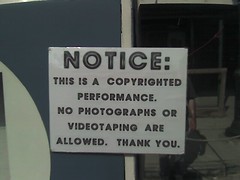The GNU project turns 25 on September 27. Not much to add beyond what I wrote on the Creative Commons blog. Watch the Freedom Fry video.
I do have some meta commentary…
The video, featuring British humorist Stephen Fry, is very British. That is, Americans might wonder if there is any humor in it at all. I’m fine with that.
It’s great that the video is posted in Ogg Theora format and works seamlessly in my browser via Cortado, and download links are provided. However, HTML to copy & paste for direct inclusion in a blog post or other web page should also be provided, as is typical for sharing video. I haven’t tried making such yet, though I should and might.
Finally, there’s a hidden jab at some in the free software movement in my CC blog post:
One of the movements and projects directly inspired by GNU is Creative Commons. We’re still learning from the free software movement. On a practical level, all servers run by Creative Commons are powered by GNU/Linux and all of the software we develop is free software.
So please join us in wishing the GNU project a happy 25th birthday by spreading a happy birthday video from comedian Stephen Fry. The video, Freedom Fry, is released under a CC Attribution-NoDerivatives license.
Emphasis added. The free culture/open content world lags the free software/open source world in many respects, one of those being an understanding of what freedoms are necessary. Some from the free software world have pushed Creative Commons to recognize that in many cases culture requires freedoms equivalent to those expected for free software/open source (that’s the first bolded link above), while some in the free software world (not necessarily the exact same people, but at least people associated with the same organizations) publish documents and videos under terms that do not grant those same freedoms (that’s the second bolded link above).
The Free Software Foundation has probably published documents under terms roughly equivalent to CC BY-ND probably before CC existed. Currently the footer of fsf.org says:
Verbatim copying and distribution of this entire article are permitted worldwide, without royalty, in any medium, provided this notice is preserved.
Does the FSF really want to reserve the right to use copyright to censor people who might publish derived versions of their texts? They probably are concerned that someone will alter their message so as to be misleading. Perhaps there was some rationale for this pre-web and pre-CC, but now there is not:
- People can easily see canonical versions by going to fsf.org. (DNS also should obsolete much of trademark as well, but that’s for another post.)
- CC licenses that permit derivatives include the following (see 3(b), 4(a), 4(b), and 4(c) for the actual language):
- Licensor can specify a link to provide for attribution
- Derivative works must state how they are altered
- Licensor can demand that credit be removed from the derivative
- Unfortunately, in some jurisdictions licensor could press “moral rights” to censor a derivative considered derogatory
So one can pre-clear the right to make adaptations and retain some legal mechanisms to club creators of adaptations (ordered from best practice to distasteful, according to me).
The Software Freedom Law Center does worse, publishing its website (also, see the SFLC post on 25 years of GNU) under CC BY-NC-ND. Do they really want to prohibit commercial use? SFLC (a super excellent organization, as is the FSF!) is dedicated to software freedom, but still it seems silly for them to publish non-software works under terms antithetical to the spirit of free software.
On a brighter note, the FSF is publishing promotional images for Freedom Fry under a free as in free software as applied to cultural works license (CC BY-SA), one of which has already been taken under those terms for use on Stephen Fry’s Wikipedia article. Ah, the power of free cultural works. :)
Do wish GNU a happy 25th birtday — watch and spread the video!


